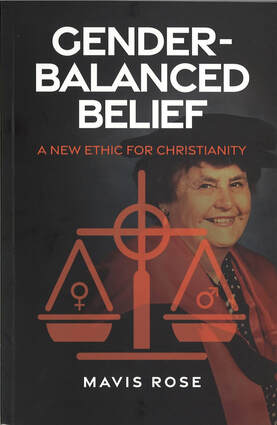 First of all, may I acknowledge the traditional owners of this land and all First Nations people in this area. I also give thanks for this cathedral, so important to me in my own journey in recent years, and all who have helped develop the unfolding work of Christian feminism which we highlight tonight. In introducing and commending Mavis’ book, I am reminded of a number of things from the first wave of Christian feminism, which was the subject of my Ph.D. One is a famous quotation from the northern English working-class leader Ada Nield Chew: women’s advance, she used to say, ‘’tis a long row to hoe.’ What we do today, as Mavis encouraged in her book, is part of a continuing journey. The South African writer Olive Schreiner put it strikingly in one of her essays, which drew heavily on biblical imagery, and helped her become the ‘muse’ of first-wave Christian feminists. One of the Anglican suffragettes, Lady Constance Lytton, referred to this in her autobiographical account of the sufferings of female campaigners in prison. We were encouraged each night in Holloway, she recalled, by readings of Schreiner’s work, not least the story ‘Making a Track’. An allegory of women’s, and others’, struggles for justice, this described a long trail of the bodies of insects stretching over a long distance. These learn, as Olive Schreiner put it. to ‘take off the shoes of dependence’, to clothe themselves in ‘the garment of Truth,’ and to use ‘the staff of Reason’ when they are lost and cannot find a way. Eventually the track of bodies reaches the banks of a river to cross into a more spacious land of freedom, fording the river with the costly solidarity of their bodies. On the other side, there is room for more authentic life and expression. ‘But what of those who did not make it?’, asks one of the characters in the story, ‘those who were swept away by the current or did not even build the bridge with their bodies?’ ‘What of that?’, comes the reply, ‘they make a track to the water’s edge’ and ‘over that bridge, which shall be built with our bodies… the entire human race will pass.’ Mavis was one of those great Brisbane women who helped form the bridge of women’s ordination, and stepped over. Yet, as the exhibition of Anglican women’s history in this cathedral affirms, she would not have been able to do so without others who had made the track to the water’s edge. Vitally, she also knew that stepping over the bridge was not enough. Much more was needed. Some of that has been in evidence in recent years, including the first female bishop in this diocese. Yet Mavis was clear that such landmarks are insufficient without a much greater transformation. This is what she calls us to in her book Gender Balance. It seeks, and embodies, not an end but an encouragement to travel on. Indeed, for me it is a particular delight to see it published, for it represents a key part of the track – after the ordination of women - that was so difficult, and which is so easily ignored. If we are to travel on further, into fuller life and freedom for all, we need to see the whole track and learn from it. This is what Mavis’ book helps provide. We are diminished without it. Understandably, after the first ordinations of women, the movement which brought them about lost steam. Partly this was because so many wonderful women poured their hearts, faith and lives into parish and other ministries hitherto denied them. This brought much fruit but came at a cost from which we are still, I think, recovering. As a lay woman who had helped lead MOW locally, Mavis saw that. Gender Balance thus represents her perceptions of what more is needed on the track. She perceives the insidiousness of patriarchy and clericalism. She asks us to go deeper, to reconsider symbols and language, relationships and support. She also reminds us of the bigger vision of Christian feminism, so much larger than ecclesial offices or church facing concerns. Lift your gaze, she continues to challenge us. Renew the pathway and the purpose your forebears marked out, at the cost of their bodies, lives and faith struggles. Mavis thus recalls us to the promise of the 21st century in which we live and to a better Faith in which to live it. She outlines how the continued undervaluing of women is a major feature of what she calls ‘Christianity’s Credibility Crisis’. Indeed, she shows how women and women’s experience is devalued in aspects of our Faith and how dissent is resisted by entrenched attitudes and structures. At the heart of this is what she calls ‘The Embodiment Problem’, even though women carry with them connections and resources which can bring new life. She affirms that women’s theology and spiritual experience can thus help to renew the expression and work of the gospel, providing health in so many other fields also. Gender Balance is not entirely complete as a vision of Christian feminism for today. For there are some new elements recently which have entered the journey, which can make us stumble or enrich us. Mavis does not really speak for example of the rise of sexual and gender diversity, which have made the track more complex and enlivening. She also wrote at a time before the full rise of recent phenomena of terrorism and anti-terrorism, and the resurgence of populism and authoritarianism in politics and religion. Yet, even in the face of such factors, Mavis reminds us in the book of other features which we have neglected. Not least, particularly at the end of this Week of Prayer for Christian Unity, is the value she rightly gives to solidarity and co-working across our denominational and national boundaries. She thus draws widely on the work of Catholic and other theologians, and on ecumenical connections, not least the inspiration that was the Ecumenical Decade of Churches in Solidarity with Women. What an idea that would be to see again! What a difference it makes when women and others make fresh linkages together, as the #MeToo movement and Marches for Justice have shown recently – the wider and deeper agenda of liberation is not lost, but renewed. I sadly only met Mavis in person once: when she came to my home, on the St Francis College site, to talk with some of our students and others about the ordination of women struggle, its legacy and learnings, and the need for the continuing journey. Yet I feel strongly that, if she were here today, she would be warmly encouraging us to take the next steps on the track – and this, she indeed does today through this book, distilling some of her lively insight, informed reading and personal wisdom, continuing to challenge us (as the self-confessed ‘Anglican spiritual guerilla’ she was) and willing us on. Do take up Mavis’ book, learn and inwardly digest, and, inspired by her spirit, and that of all who have gone before us and made the path to the water’s edge, build the next bridge and help others cross over. For like Mavis, we either help to make our own history, or are condemned to be victims of it.
0 Comments
Why are we here? Why are people of so many diverse faiths involved today in worldwide climate change advocacy and why do we need to sound the alarm? The short answer is - We are United by a common human spirituality - of solidarity, scriptures, and science... (my brief address at the Sound the Alarm Green Faith day of action for climate change, 11 March 2021)... Three things then:
1. We are United by Solidarity - with our planet and its suffering peoples (those closest to the land and seas) * We increasingly make Acknowledgement of Country but are we listening and honouring the spirituality of First Nations people - who speak particularly as voices of the Land and seas themselves? * Let us indeed listen to the voices of our land and seas! * Why are we not listening, for example, to my friend, the Senior Queenslander of the Year, Aunty McRose Elu and Torres Strait Islanders (king tides etc)? * Why are we not responding to our Pacific Island neighbours? * Why we not acting to address the increasing numbers of Environmental Refugees? 2. We are United by Scriptures * The BIble at least is quite clear - indeed the first command in the Bible is to care for Gods Creation * The Book of Deuteronomy is but one further key text - telling us that God, land and people all suffer when one suffers * Jesus also drew his teaching from the Earth - can we not see the seasons? Jesus said * Jesus too called us to wake up, to repent (that is, to turn around and change our behaviours), and to sound the alarm * These themes are echoed in other faith traditions - hence our common stand today 3. We are United by Science * Science is no enemy of good faith but rather faith and science are essential partners * Climate change is such established scientific fact, just like Covid-19 - and like that virus we need to act effectively (as Australians, including our Governments, have shown we can do with Covid-19) * Let us take but one recent report - where 19 out of 20 Australian key ecosystems that were examined were found to be collapsing - from coral reefs, through Murray-Darling waterways and arid desert, to our extraordinary rainforests * Have we forgotten the devastating bushfires just before the Covid-19 outbreak?! * We’ve made Gods out of narrow economic growth totems and fossil fuels - so its time for change, as with lead pollution and CFC’s * Research also shows we can best address jobs and futures through climate change action - thus also addressing the manifest inequalities and stresses revealed by Covid-19 * Action benefits us all Solidarity - Scripture - and Science are as one... so let us Sound the Alarm - The time for action is now! 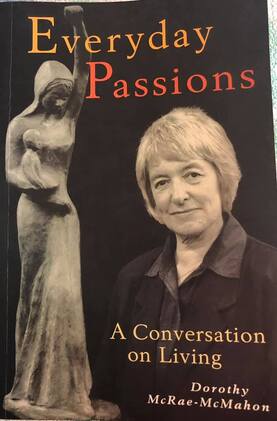 It is funny how certain books jump out at you at particular times - and this one (Everyday Passions: A Conversation on Living) leapt at me today as I reflected on All Saints and the communion of the just/justified. For the author, Dorothy McRae-McMahon, has always been incredibly high on my list of Australian Christian heroes and this liturgy (the first page below) seems particularly appropriate right now. I’ve only met Dorothy in person once - sharing a platform in the Blue Mountains a number of years ago - and she seemed quite surprised then when I said she had been such an inspiration to me. She shared her wisdom in a NSW ecumenical project on prayer I once organised too (albeit she was then too ill to attend the key event in Sydney) and my involvement of her brought swift reaction from Sydney Anglican leadership - evidently they felt prayer was thereby made invalid, and ‘no Sydney Anglican will be part of the project if Dorothy McRae-McMahon is involved’ (as it happens, as on a number of other things, they proved wrong on that!). All of that kind of thing most certainly shouldn’t dent our courage for love and living truthfully. For as Dorothy wrote in this book (in the chapter ‘Living Life Under Attack’): ‘I would never choose to live under attack, but I will never regret living in ways which sometimes make it almost inevitable... To live in a way that produces attack in order to live more truly (as against choosing martyrdom) is to live with passion.’ The book ends with Marge Piercy’s poem ‘For Strong Women’ and Dorothy’s final words: ‘Living is, indeed, an everyday passion and “strong is what we make each other”’. With blessings and solidarity to those saints who live into wholeness and inspire others this All Saints-tide. 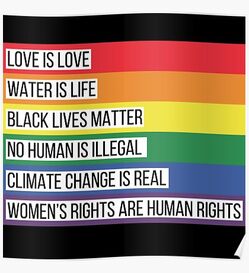 One of the reasons I was happy to be part of the trans faith film Faithfully Me (premiered tonight) was film maker Rachel Lane's track record of assisting in sharing the voices of other typically marginalised groups, not least Aboriginal ones. For one of the challenging invitations of our time is nurturing intersectional relationships which enable justice and fullness of life for all - for too many, otherwise very necessary, 'identity' struggles are weakened by restricted commitments and groups which tend only to include their own kind. Over the years, many Aboriginal & Torres Strait Islander leaders have pointed me to a better way, supporting the needs and hopes of others even, at a cost, when their own are so outstanding. We 'progressive' white folk haven't always reciprocated well. Here, below, is a little excerpt from Secret & Sacred, an example of Rachel's earlier work, a glimpse of the deep wisdom of the Badjatala people (whitefella Hervey Bay & Fraser (K'Gari) Island region), but a snippet of the neglected ancient but very much living wisdom of this land. With particular thanks to Glenn Loughrey and Dianne Langham, Canon Bruce Boase, and Aunty Rose Elu for their continuing personal inspiration to me in sharing solidarity - and to other friends, like Tony Robertson and Johnny Valkyrie, who respond so beautifully and model how the liberation of any of us is entwined with the liberation of us all. This is so absolutely contrary to today's right-wing 'religious freedom' push, and central to authentic catholic faith, as so powerfully expressed in John Donne's Meditation 17: for the bells which toll, toll for us all. The chimes of freedom - human rights and flourishing - are indivisible - so let's ring out our different bells in a harmony of joy :-) 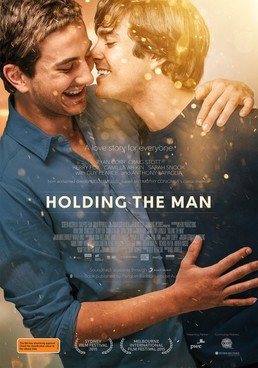 It was a delight yesterday to see the film Holding the Man with one of my most lovely, compassionate and Spirit-filled gay friends. Based on the poignant 1995 memoir of Tim Conigrave, Holding the Man (a resonant expression drawn from Australian Rules Football) tells the story of the love and life he shared from schooldays with John Caleo, including the struggles they faced with others and their tragic early deaths from AIDS-related illnesses. Adapted by Tommy Murphy in 2006, Holding the Man became one of the most successful of recent Australian stage productions. This film version will hopefully widen the audience much further, honouring Tim and John by increasing light and understanding and strengthening our human solidarity against all kinds of sexual and gendered oppressions. The film is certainly also 'a story of a generation'. From a personal point of view, as an exact contemporary of Tim and John (albeit on the other side of the world), I was indeed touched by remembrances of my own school days, university experiences, and early adult life, especially of wonderful gay and lesbian friends who also endured much pain (including some even to shocking early deaths) whilst vibrantly helping to transform our inherited climate of fear and repression. I also recalled my days as a young priest in London in the 1980s as the horror of the AIDS crisis broke upon so many, together with the horribly fumbled, generally fear-filled and, occasionally, fabulous response of Christians, as church bodies and individuals. How far have we come? In many ways, we have traveled a long way, even in Christian circles. Yet only a few days ago the New South Wales Government banned the showing in schools of the film Gayby Baby, which offers the opportunity to enter into the experiences of children growing up in lesbian and gay families. All credit therefore to Dendy Newtown for screening Gayby Baby at this time, to encourage others to enlarge understanding and provide public pressure upon uncertain authorities. Indeed, as we bought tickets for Holding the Man, my friend observed to the young cashier that he had had to travel from the Central Coast to find the nearest screening. 'How sad', in this day and age', she replied, 'that cinemas everywhere aren't showing it.' For all the gorgeous steps taken, we are still very much on the journey of compassion and solidarity, never mind of celebration. Indeed, alongside admiration for so many like Tim Conigrave and John Caleo, I was left yesterday with deep sadness, and renewed frustration and anger, at the slowness, and sometimes sheer reaction, of so many Christians fully to love their sexual selves, so many of their 'neighbours', and their God of infinite compassion and creative diversity. In the context of my generation, the negative responses of Church authorities and Christian parents to Tim and John's love was more understandable, though no less shocking and stabbing to the very heart. I rejoice in those, across the world and from so many Christian traditions, who are seeking to walk a different pathway, centred on a Christ of a very different yet authentically biblical hue. Compared to the wider western world however, and even the attitudes of the bulk of our own church membership, I fear the institutional church is still a very long way from where we should be. As Aussie Rules would have it, if we are not, in different ways, 'holding the man', then we are so often either not even on the paddock, or 'holding the ball' of a bygone generation. May we be kissed afresh with peace, joy and understanding. 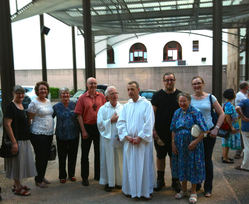 It was a delight last Sunday evening to see again Brothers Ghislain, Matthew and Alois (the Prior) from the Taize Community and even more delightful to take some of our parishioners and boarders from The Glennie School to share in Taize Prayer in St Stephen's Cathedral in Brisbane. This followed on from our beautiful Taize-style Candlemas Prayer the previous Sunday in St Luke's Toowoomba. This year is the 75th anniversary of the founding of the remarkable Community in the little village of Taize in Burgundy, 100 years on also from the birth of the founder Brother Roger. It continues to act as an inspiration to so many people in so many places and situations in our world. Above all, its Christ-centred spirit of simplicity, solidarity and celebration speaks to young people who continue to join in 'the Pilgrimage of Trust' in such great numbers. The special Letter in preparation for this year's anniversaries is again a beautiful distillation of the Taize spirit and an encouragement to us all to walk together 'Towards a New Solidarity' with people of all Christian, ethnic and other backgrounds, with people of all faiths and none. Check our the Letter here. 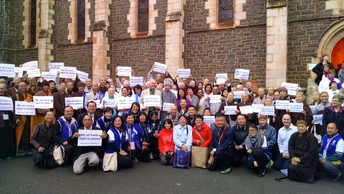 For a number of years in my last job I was a frequent visitor to the Lindt Café in Sydney’s Martin Place, the site of the recent Sydney siege. It was a common stopover after our combined New South Wales Churches’ executive meeting and a great place to relax and be refreshed. Ironically we also often discussed the many inter-faith and peace initiatives with which we were involved. For Sydney is an amazing place, full of so many different peoples, faiths and cultures. The range of that diversity can be a challenge but it is a great tribute to the city that so much positive inter-faith and peace prayer and action has been fostered over the years. This is part of what of what will enable Sydney, and the rest of Australia, to triumph and flourish after the tragedy of recent events. The Sydney siege is a further confirmation of how vital is our prayer and work for community harmony, not least through the Toowoomba ‘Model City of Peace and Harmony’ initiative. When such terrible events happen, as they happen in different ways daily across the world, they can either erode our trust in one another or impel us to renew our faith in the love at the heart of the universe, differently displayed in various faiths and cultures. The strong base of relationships we have already established in Toowoomba certainly puts us in a good position to support those who are afflicted, to share solidarity with Muslims and others who are afraid or fear victimisation, and to create new partnerships for peace in our lives and wider world. The recent events in Sydney remind us again of how ‘no one is an island’ and how we are all affected by what else happens in our world. At home, Australia has mercifully been free of such events but it has always been connected to them overseas. Such connections can now make us afraid, if we let them, or they can make us stronger than ever in the things that truly matter. From a Christian perspective, terror at Christmas should hardly be a surprise. Terror is written into the Christmas story itself. For Jesus was born into an oppressive and violent society, and, according to the scriptural stories, the holy family was forced to flee into Egypt as refugees, in the face of Herod’s massacre of the innocents. Yet Christ’s birth stands as a sign that such darkness, then and now, is not the end. There is something much, much stronger and deeper and transforming. So let us trust in that Spirit, shown also in the Magi, people of very different faith and culture, who left their comfort to share the light and love of God at the birth of Jesus. May that peace prevail in our hearts, our community and our world, that Toowoomba with Sydney may be fresh beacons of compassion and peace in the days ahead. Let us ride together on the path of peace. 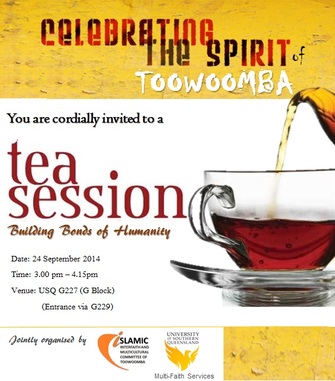 It was a delight to meet with local Muslims today to affirm our shared concern for one another, our city and peace in the world. A number of people spoke well, not least Dr Shahab Abdullah the spokesman for the local Iraqi Muslim community. Tea and cake then helped seal the deal. What a contrast with the over-reaction of some, including those who closed three local military museums this week, thus, to my mind, exacerbating community anxiety rather than alleviating it. Even the police present seemed a bit embarrassed about currently having to wear firearms as part of the security reaction to recent events. Whether that is alarmist or not, it certainly does not reassure those of us who tend to feel less secure in the presence of weaponry rather than with it. More positively, it was a joy to speak with five Indonesian Muslim women who are in their last week of five in Toowoomba. They spoke with wonderful pleasure of their experience here, not least the excited interest they had conjured up in visiting a local school yesterday. Once again the benefits of 'table fellowship' shone through: last week in the Buddhist monastery, Sunday in St Luke's, today among USQ Muslims. Such is an important path to peace. As another Christian pointed out to me last week, in a much more conservative Christian setting, Jesus was much more a guest than a host. Should more be willing to step out of their comfort zones and risk vulnerability, there would similarly be much more joy and solidarity to quell our own anxieties and transform the world's genuine fears. Anyone for another cup of tea? 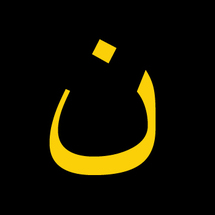 “If one part suffers, every part suffers with it." (1 Corinthians 12.26) - this is part of the reality of our contemporary lives in the one world we now inhabit. It is very difficult not to be affected by the sufferings of other parts of the world, particularly if we share in Christian relationship. The situation in Iraq is a particularly grave one. As the Archbishop of Canterbury observed recently: what is happening right now in northern Iraq is off the scale of human horror… we cry to God for peace and justice and security throughout the world, and especially for Christians and other minority groups suffering so deeply in northern Iraq. It is therefore a sad but important duty to share in prayer and solidarity with those who suffer. As we do so, so much of scripture also comes alive in a powerful manner and we are drawn back to the cross and mercy-power of God. 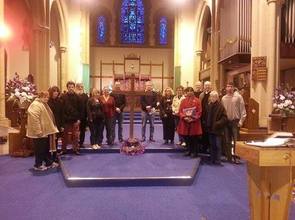 Yesterday, in St Luke's Church, we shared a particularly poignant Prayer together with other Christians. The initiative was from a young Christian, Courtney Heyward, from another (independent Evangelical) church, who has been touched to the heart by the situation in Iraq. It was a reflective occasion, with readings from scripture interspersed with times for silent or shared prayer. Stones, or 'prayer rocks', were given to everyone present to hold as we prayed, reminding us of the hard things endured by others (including the burying of loved ones by the side of the roads of flight) and of the rock of God's love at the heart of all things. Towards the end of the gathering, each of us laid our stone at the foot of the cross and lit a candle of hope. We also shared some ways in which we may offer practical support to the persecuted, including giving to appeal funds and advocating for the needs of refugees. May God's mercy and strength comfort, turn the hearts of those who inflict terror, grant wisdom to those in leadership, and renew all who suffer. |
AuthorJo Inkpin is an Anglican priest serving as Minister of Pitt St Uniting Church in Sydney, a trans woman, theologian & justice activist. These are some of my reflections on life, spirit, and the search for peace, justice & sustainable creation. Archives
July 2024
Categories
All
|
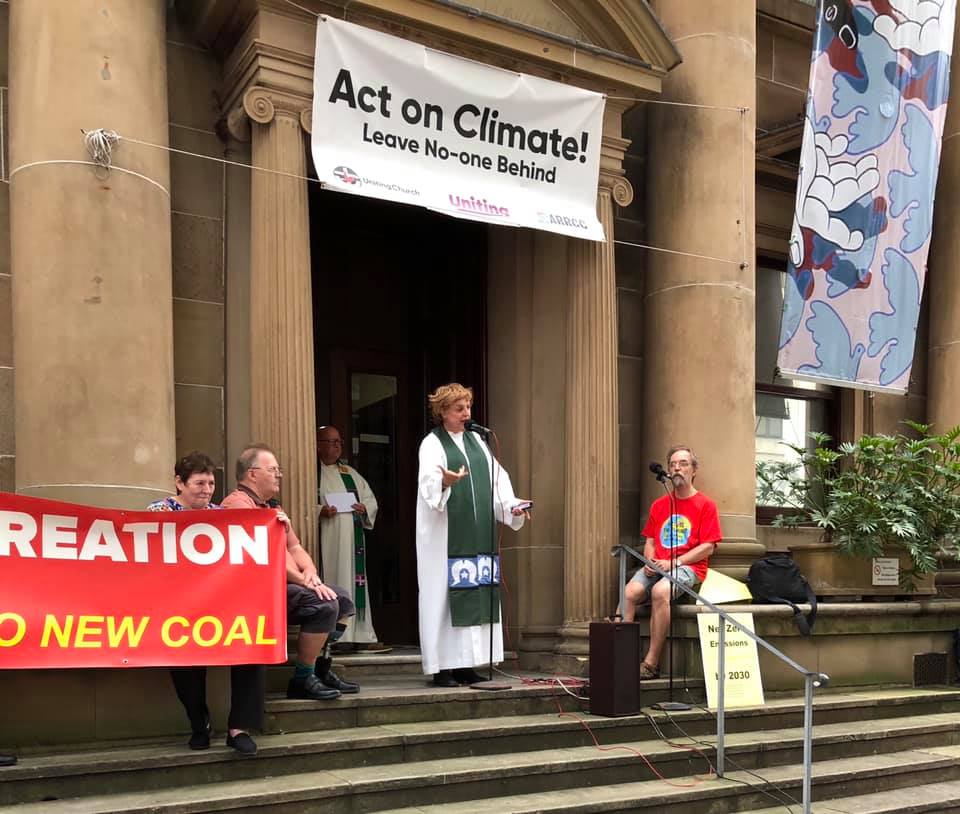
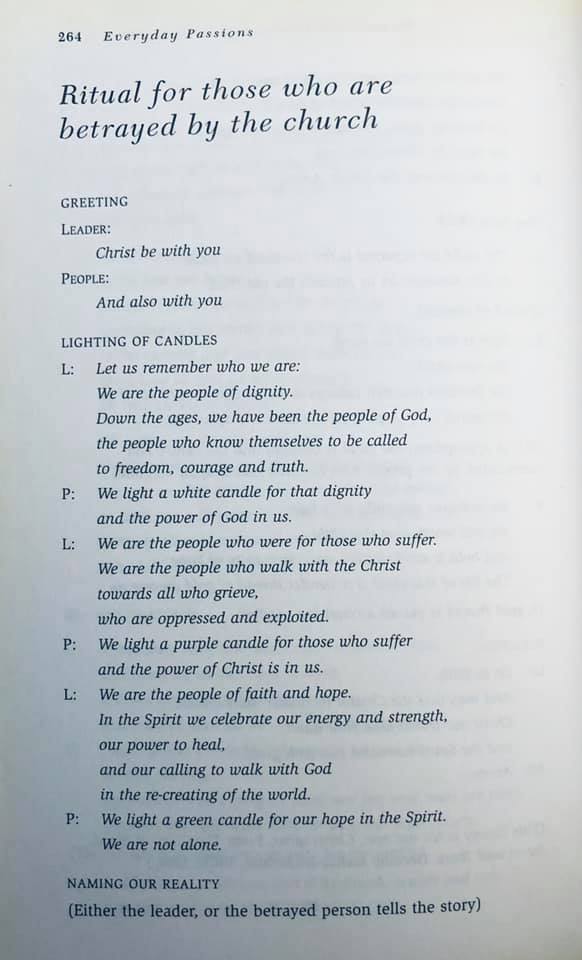
 RSS Feed
RSS Feed